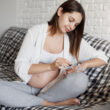Natural Womanhood reader Olivia Chasteen is the current Director of Fertility Education for the SymptoPro method of natural family planning (NFP). But once upon a time back in her teens, she was prescribed the pill to manage frequent menstrual bleeding. In this installment of our Coming Off the Pill series, she shares her experience on the pill, why she stopped taking it, and her introduction to and embrace of NFP (known more commonly in non-religious circles as fertility awareness or fertility awareness methods (FAM)).
Like many teen girls, Olivia experienced irregular bleeding
Irregular bleeding isn’t per se unusual for the first few years after menstruation starts, as we covered in a two-part series on teen cycles (Part 1 is here). But what Olivia experienced was out-of-the-ordinary.
She explained,“When I first started menstruating around age 16, things were highly irregular. While the bleeding was never crazy heavy and I never had cramps or pain, I was bleeding about every 2 weeks. And once it started, it would go on for more than a week at a time. Not knowing where else to turn, my mother brought me to my regular doctor at the local hospital.”
Why irregular or heavy bleeding in teen girls should be addressed, not covered up
Putting a pin in Olivia’s story for a minute, the American College of Obstetricians and Gynecologists (ACOG) acknowledges that the menstrual cycle is a fifth vital sign, especially for teens and young women. In a 2015 committee opinion reaffirmed in 2021, ACOG stated:
“Identification of abnormal menstrual patterns in adolescence may improve early identification of potential health concerns for adulthood.”
Box 2 of the same ACOG document lists no less than 14 conditions that abnormal uterine bleeding might indicate, ranging from stress to blood clotting disorders to thyroid problems to (gulp!) cancer. Abnormal bleeding in a teen girl, then, is definitely worth a workup. But that’s not what Olivia experienced.
Her doctor offered the birth control pill
Instead, she recalled, “The only option I was given was oral contraception. No tests were run to determine the cause of the bleeding or rule out any pathology. I was given a prescription for oral contraception and told that it would ‘regulate’ my cycle. I asked about possible side effects and if it had the potential to interfere with my future fertility, and I was completely brushed off and told that it couldn’t possibly affect my fertility down the road.”
Olivia knows now that a normal cycle, with ovulation and menstruation, is very different hormonally from what happens on the pill and that the pill doesn’t regulate but overrides the cycle. Without ovulation and menstruation, the growing female body is deprived of certain health benefits, as covered in our Reasons Women Need Periods series. But her doctor shared none of this with Olivia and her mom.
Olivia took the pill for 6 months but her period didn’t return for over a year afterward
She continued, “So for 6 months I took the pill. I had a boyfriend, but I was not sexually active [and had] no intention to become so, and so the only benefit I got was that my frequent bleeding stopped. My new ‘periods,’ or rather withdrawal bleeds, happened on schedule, though for the first time in my life they also gave me cramps.”
She went on, “The doctor had told me I only needed to take the pills for 6 months to regulate my cycle, so I stopped taking them after that point. However, I then went on to have post-pill amenorrhea that lasted more than one year. I never brought this up to my doctor because the one tool in her toolbox failed to fix the issue last time, and I didn’t want to go on the pill again.”
As many women have found, Olivia learned that the pill unfortunately didn’t fix what was wrong
She observed, “Eventually my cycle started on its own again, but once again, nothing was regular. This time though, my cycles were very long, often in the range of 60 days before menses would begin again.” This pattern, or lack thereof, became Olivia’s “‘normal” for the next few years.
Olivia said, “Things stayed like this through college, and I continued to keep things to myself because I had no interest in going on the pill again. Granted, I don’t recall any doctor asking me about my cycle during those years either.”
A friend noticed “mini personality changes” in women who went on the pill
Olivia knew plenty of her female peers were on hormonal birth control. But she noted, “personally, I had a fairly strong aversion to taking pharmaceutical drugs and a general distrust of doctors that stemmed from prior medical trauma.”
There were other reasons not to go back on birth control. Interestingly, “One of my closest friends in high school also pointed out that she could tell who started taking the pill because they’d undergo a mini personality change and suddenly become very moody. I started paying attention to this, and she was right.” Olivia continued to avoid hormonal contraception throughout college and beyond, but she had yet to hear about what could be done to actually treat the reproductive issues she and other young women experienced.
Until she learned about SymptoPro, her only knowledge of NFP was the rhythm method
Until her engagement, Olivia had little knowledge of natural family planning or FAMs. She “knew that my parents had utilized the rhythm method in their marriage, and that while my sisters and I were planned, both of my brothers exist because the method wasn’t very effective for them.”
She “had never heard about modern methods of NFP until I was engaged, and was required to take a full course of instruction as part of my marriage prep requirements for getting married within the Catholic Church.”
That was when Olivia learned SymptoPro, the symptothermal method that incorporates cervical mucus observations, vaginal sensations, and daily basal body temperature (BBT) readings. Many other couples in her local area were already effectively using SymptoPro for family planning, so plenty of community support was available to Olivia and her husband. She noted, “I didn’t need any convincing. I wanted kids, so having my cycle disappear for a year or more at a time wasn’t a good option for me. As an avid reader, I’d also come across some books on [Pope John Paul II’s teachings on the] Theology of the Body, and I fell in love with this view of human sexuality as a gift.”
Sometimes women need to switch NFP methods, but SymptoPro’s been a great fit for Olivia
Sometimes, being postpartum or starting night shift work or other lifestyle changes necessitate switching FAM or NFP methods, but that hasn’t been the case for Olivia. She said, “after becoming more involved in the fertility awareness world, I did come to realize that other methods existed. Initially, I had no idea.”
Still, she observed, “I’ve never felt the draw to switch to another method. Not only had I already gone through training and had experience with the SymptoPro method, but I do feel like it is a good fit for me and my lifestyle. I love the info and reassurance I get from having my temperature records, and the simplicity of it becoming part of my regular routine really works for me. And it’s cost effective in that I don’t have to continually purchase testing strips. I love that other methods exist so that women and couples can find what works for them, but I am grateful that just by happenstance, I ended up with the method that is a clear fit for me.”
What she wishes other women and couples knew about NFP and FAMs like SymptoPro
Olivia shared, “Now, as someone who gets to work and spend my days surrounded by the message and research behind modern NFP methods, I couldn’t be happier to share that information with others. I wish more women and doctors knew that there is another tool in the toolbox, because I wish I had known when I was a teenager.”
She wishes her younger self had been given the full picture of the potential harms of hormonal birth control and that she’d been educated on what else could be done to dig for real answers instead of a Band-Aid ‘quick fix.’ “Perhaps I wouldn’t have been given a pill that increases my risk of developing breast cancer. Maybe my doctor would have ordered a hormone panel or an ultrasound to investigate possible causes behind my issues. While I have never been given a diagnosis of any sort, looking back over my cycle history and knowing what I know now, indicators of possible PCOS [polycystic ovary syndrome] were there, and at the very least something abnormal was going on.”
In her professional role now as a SymptoPro instructor and Director of Fertility Education, Olivia ensures other young women and couples can access the personal health data and providers trained in restorative reproductive medicine that she never had access to in her teens or during college. “I know now that doctors who are educated in natural fertility and hormonal health exist.” She’s “thankful that even though I’ve never worked with one of [them], I’ve been able to monitor changes in my cycle charts to determine which supplements and lifestyle factors make a difference for me and my health.” Through her professional work, she’s helping other women do the same.
Additional Reading:
Coming Off the Pill: Eden’s Story
Coming Off the Pill: Taryn’s Story







